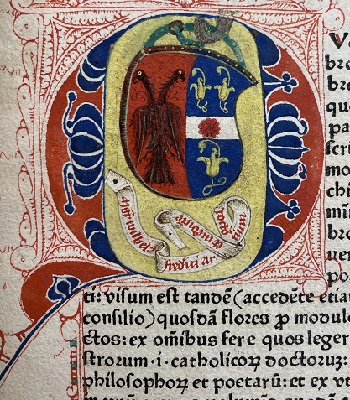Tentoonstelling: tastbare bewijzen in incunabelen

In de oudste collecties van de Universiteitsbibliotheek Groningen bevinden zich de incunabelen, de ‘eerste generatie’ gedrukte boeken (gedrukt voor 1501). Deze indrukwekkende bijbels, zorgvuldig gedrukte klassieke teksten en bescheiden devotionele werken hadden al veel meegemaakt, voordat ze in de universiteitsbibliotheek terechtkwamen. Eeuwenlang zijn ze bewaard, gelezen, gekoesterd of juist verwaarloosd. Ze veranderden van eigenaar, zijn gerestaureerd of aangepast aan uiteenlopende wensen en behoeften.
Vandaag de dag kunnen we nog steeds een uniek inkijkje krijgen in deze gebruiksgeschiedenis door het "tastbaar bewijs" — de sporen die individuen achterlieten in hun boeken, zoals eigendomsinscripties, decoraties en notities in de marges. Deze gebruikssporen onthullen wat er gebeurde met de boeken, nadat ze van de pers kwamen. Van wie waren ze? Hoe werden ze gebruikt? En hoe zijn ze in de bibliotheek terechtgekomen waar we ze nu nog kunnen lezen en bestuderen?
Anna de Bruyn is promovenda bij het Research Centre for Historical Studies aan de RUG en haar onderzoek behelst vijftiende-eeuwse boekillustraties. Ze bestudeert ontwikkelingen in illustratiepraktijken in de overgangsperiode van manuscripten naar gedrukte boeken.
In het afgelopen studiejaar deed Anna uitgebreid onderzoek naar de incunabelen in de Universiteitsbibliotheek Groningen. Zij stelde een prachtige online tentoonstelling samen van wat ze ontdekte.
| Laatst gewijzigd: | 05 januari 2022 13:00 |
Meer nieuws
-
17 juli 2024
Veni-beurzen voor tien onderzoekers
Aan tien onderzoekers van de Rijksuniversiteit Groningen en het UMCG is een Veni-beurs van maximaal 320.000 euro toegekend. De Veni-beurzen worden jaarlijks toegekend door de Nederlandse Organisatie voor Wetenschappelijk onderzoek (NWO) en zijn...
-
25 juni 2024
Hoe om te gaan met microplastics in ons dagelijks leven
Irene Maltagliati richt zich in haar onderzoek op de vraag hoe we ons meer bewust kunnen zijn van microplastics en ons gedrag kunnen veranderen.
-
17 juni 2024
De Young Academy Groningen verwelkomt zeven nieuwe leden
Na de zomer verwelkomt de Young Academy Groningen opnieuw zeven nieuwe leden. Hun onderzoek bestrijkt een breed scala van onderwerpen, variërend van spraaktechnologie tot de filosofie van ethiek en politiek en de polymeerchemie.

